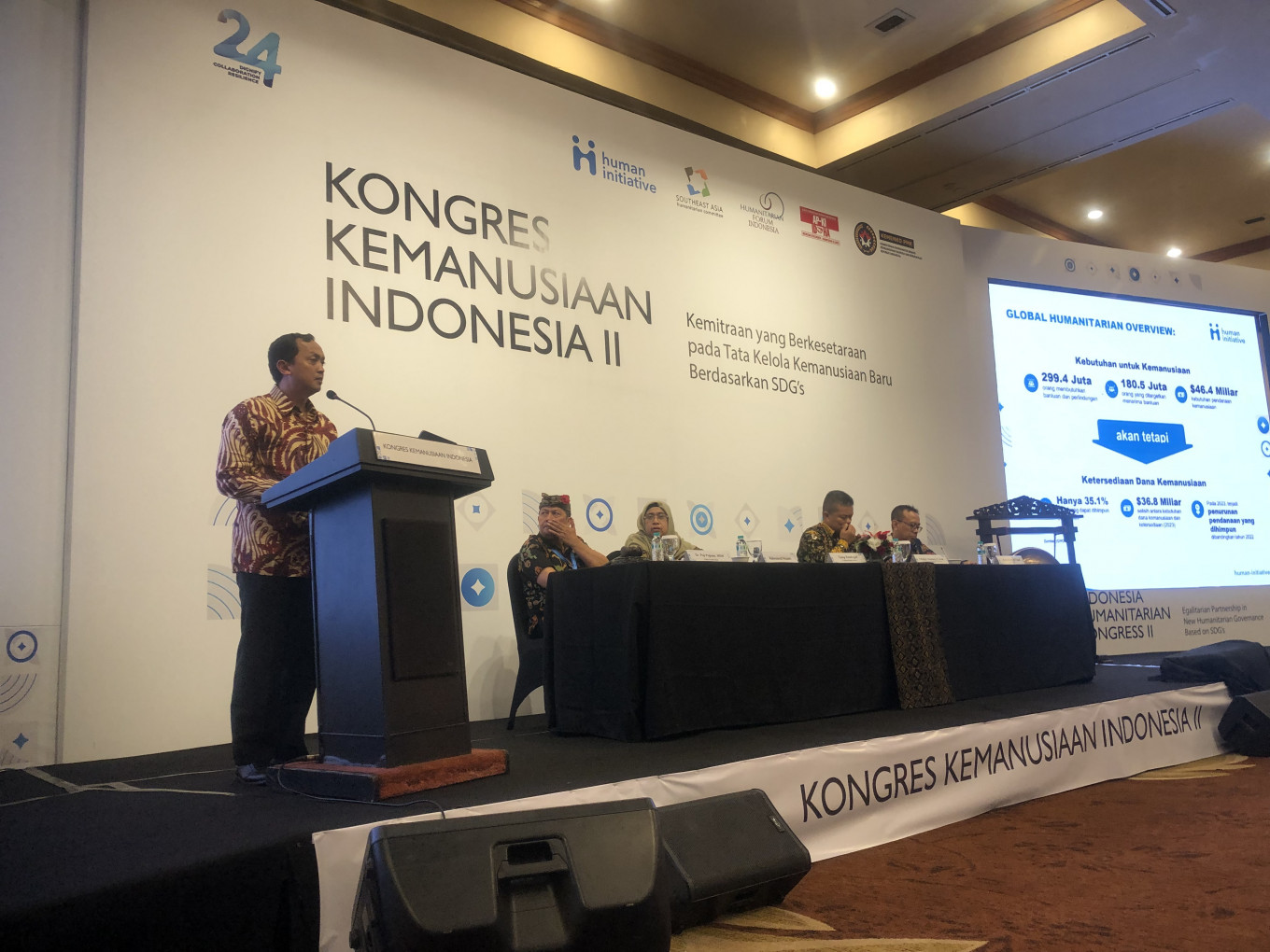Popular Reads
Top Results
Can't find what you're looking for?
View all search resultsPopular Reads
Top Results
Can't find what you're looking for?
View all search resultsIndonesian Humanitarian Congress II: Formulating "new humanitarian governance"
The situation in the Middle East has become a shared wound for the global community, as it continuously erodes and prolongs the fundamental principles of justice at an unprecedented rate in modern history.
Change text size
Gift Premium Articles
to Anyone
T
he situation in the Middle East has become a shared wound for the global community, as it continuously erodes and prolongs the fundamental principles of justice at an unprecedented rate in modern history. At such a scale, the humanitarian crises in Southeast Asia, including the prolonged crisis of the Rohingya and the impact of the coup in Myanmar, have disappeared from the radar.
On the other hand, the global economic downturn following the COVID-19 pandemic has narrowed the funding space for humanitarian responses. The Global Humanitarian Overview 2023 states that a total of 339 million people will need humanitarian aid and protection, with 230 million of them in urgent need. Meanwhile, risks and disaster events, extreme weather incidents due to climate change and ongoing technological and industrial failures continue to occur. When these intersect with the context of conflicts and deficits, as well as development failures, it becomes a new challenge for humanitarian survivors.
In the increasingly chaotic scenario, the working relationships among governments, humanitarian actors, partners as well as stakeholders and survivor communities, are undergoing dramatic changes. The search for an optimal format continues at all levels, globally, in the regional context of Asia and ASEAN, in Indonesia and particularly at the local level.
Addressing the evolving humanitarian issues, Human Initiative commemorates its 24th anniversary by organizing the Indonesian Humanitarian Congress, located at the Millennium Sirih Jakarta Hotel (14/12) in Jakarta. The Indonesian Humanitarian Congress II (IHC II), initiated in collaboration with the Expert Council, Office of the Coordinating Human Development and Culture Minister, the Indonesian Humanitarian Development Alliance and the Indonesian Humanitarian Forum, serves as a forum for discussion, thought exploration and ideas in responding to humanitarian challenges.
In general, the IHC II in 2023 aims to: (1) mature and sharpen the Indonesian Humanitarian Framework produced from collective multistakeholder humanitarian reflections; (2) establish the foundations of equal partnerships in the humanitarian and development movement to sustain the momentum of achieving the Sustainable Development Goals (SDGs) targets and (3) formulate innovative action recommendations related to the humanitarian funding scheme within the framework of humanitarian resilience at various levels.
"We are grateful to still be trusted to host this discussion and idea exchange forum. Continuing the agenda from the first Indonesian Humanitarian Congress in 2021, and celebrating the 24th anniversary of Human Initiative, this time we focus on the message of equality in partnership," said Tomy Hendrajati, president of Human Initiative.
With the theme Equal Partnership in New Humanitarian Governance Based on SDGs, this forum is discussed in two major segments, namely discussions on national and global levels. The topics addressed in this forum include the Principles of the Humanitarian Agenda Method and the Indonesian Humanitarian Framework; Strengthening Coordination Platforms and Partnerships in Empowering the Role of Local Humanitarian Actors; Indonesian Humanitarian Framework for Global Humanitarianism; Strengthening Coordination Platforms and Partnerships in Supporting Global Humanitarian Response and Strengthening Sustainable Humanitarian Funding Resources in Empowering Humanitarian Response.
"Indonesia's diversity is no longer just cultural and ethnic diversity, but also the diverse risks of disasters and crises we face. Therefore, building a more resilient humanitarian response system is crucial. In this regard, the Indonesian humanitarian framework is designed to be a guide that represents Indonesia's identity and a common reference in organizing humanitarian efforts, based on equal partnerships between non-governmental humanitarian actors, governments, international partners and especially with local actors and at-risk or affected communities," explained Puji Pujiono, expert council of the IHC II.
On the same occasion, Human Initiative released a book titled Carving a World Smile: Footprints of Humanitarian Diplomacy Dignifying Those in Need as a step to compile humanitarian activities. This book, capturing the journey of Human Initiative, summarizes Human Initiative's humanitarian actions in responding to various humanitarian issues, especially in 12 countries worldwide.
This forum, attended in a limited and hybrid manner, represents various sectors. Various philanthropic institutions actively involved in the humanitarian sector, government entities, the private sector, academia, practitioners, United Nations agencies and mass media were present. Not only that, Human Initiative, as the organizer, also brought beneficiaries of philanthropic humanitarian programs, the Office of the Coordinating Human Development and Culture Minister, the Indonesian Humanitarian Forum, the Indonesian Humanitarian Development Alliance and SEAHUM. This was based on the principle of equal partnership, enriching the forum with diverse ideas and thoughts from various elements.










